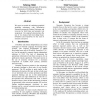8 search results - page 1 / 2 » Lexical knowledge and human disagreement on a WSD task |
CSL
2004
Springer
13 years 5 months ago
2004
Springer
This paper explores factors correlating with lack of inter-annotator agreement on a word sense disambiguation (WSD) task taken from SENSEVAL-2. Twenty-seven subjects were given a ...
LREC
2010
13 years 6 months ago
2010
In the paper we investigate the impact of data size on a Word Sense Disambiguation task (WSD). We question the assumption that the knowledge acquisition bottleneck, which is known...
CICLING
2005
Springer
13 years 11 months ago
2005
Springer
The problem of the resolution of the lexical ambiguity, which is commonly referred as Word Sense Disambiguation (WSD), seems to be stuck because of the knowledge acquisition bottle...
NAACL
2003
13 years 6 months ago
2003
We report on results of combining graphical modeling techniques with Information Extraction resources (Pattern Dictionary and Lexicon) for both frame and semantic role assignment....
CONTEXT
2003
Springer
13 years 10 months ago
2003
Springer
Abstract. The knowledge representation tradition in computational lexicon design represents words as static encapsulations of purely lexical knowledge. We suggest that this view po...

